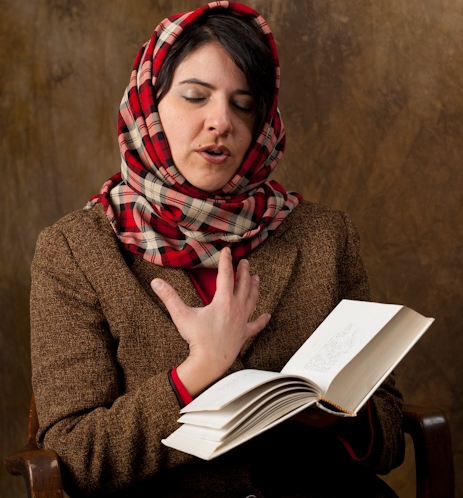Worship
To kiss is to make ablution,
cleansing the naked heart
and preparing the shivering soul
The hands when they rise
and fall, moving over waist
and hips, push away doubt
To open the thighs in love
is the first prayer on the eve
of the holiest night
of a thousand months
Finally, the cry comes
that affirms faith,
bears witness, testifies
to the truth and its messenger
In the clasping of the bent head
to the neck and the breast,
in the pillowing of slackened
belly upon belly
is peace, peace,
until the rising of the dawn
~ From Mohja Kahf’s unpublished love poetry manuscript written in 1999.
—

Mohja Kahf, born in Damascus in 1967, is a Syrian-American poet and novelist. Her own conception of Islamic feminism influences the themes of her poetry and writing as do other issues facing American Muslims. Her first collection of poetry, E-mails from Scheherazad, evokes the mixture of pride and shame involved in being an “other,” with characters balancing on the line between assimilating and maintaining the habits of a good Muslim. She explores both important historical female figures in Islam as well as contemporary Muslim women. Historical figures prominent in Mohja’s poetry include Hagar, the wife of the prophet Abraham, Khadija and Aisha, wives of the Prophet Muhammad, and Fatima, daughter of the Prophet Muhammad. According to The New York Times, her writing on contemporary subjects “draws sharp, funny, earthy portraits of the fault line separating Muslim women from their Western counterparts.”
Of the intersection of Islam and art, Mohja says: “One of the primary messages of the Qur’an is that people should recognize the beautiful and do what is beautiful. This is not simply a moral beauty but a visual and auditory beauty as well. Conduct should be beautiful, writing should be beautiful and speaking should be beautiful.” The beauty in Mohja’s writing ranges from the classically reverent in her poems about historical figures to a beautiful humor that simultaneously enlightens. Egyptian-American professor Dina Ibrahim commented on Mohja’s work after attending one of her readings. “It is just so refreshing for someone to put a lighter spin on being a Muslim in America,” she said. “Are we only going to talk about the war, are we only going to talk about how our faith is so misunderstood? It gets really old.












